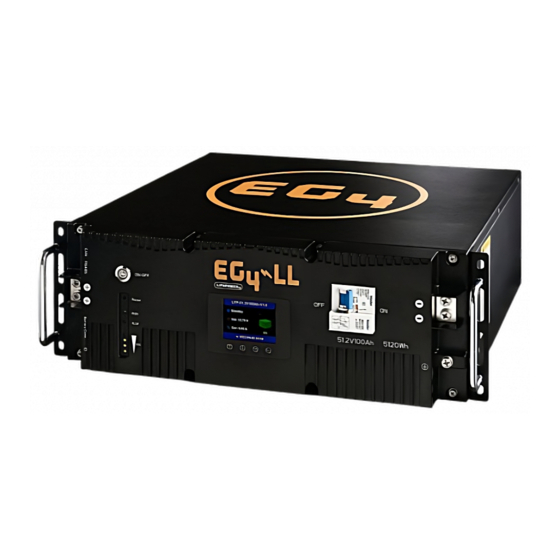EG4 EG4-LL Podręcznik użytkownika - Strona 10
Przeglądaj online lub pobierz pdf Podręcznik użytkownika dla Akumulator EG4 EG4-LL. EG4 EG4-LL 20 stron. Rack mounted 48v 100ah/24v 200ah

What To Expect During a Charge Cycle
It is normal for LFP batteries that have their own internal BMS and that are wired in parallel to
demonstrate a fairly wide variety of SOC readings during any given charge or discharge cycle. Variations
of up to 10% are common. This is not cause for concern or indication you are getting anything less than
the full capacity of your pack. This is caused by even slight variations in wiring resistance to each battery,
internal resistance, temperature differences and variations in cell manufacture. Even a slight variation
causes one battery to take more of the load or charge for a while. Over the duration of the discharge or
charge cycle, this will balance out with the lagging battery then taking the load or charge at the other end
of the cycle resulting in recovering the full listed KWH capacity of the pack. The voltage differences
created as batteries diverge in SOC will eventually cause them to converge at some point in the cycle.
Introduction to the BMS
The BMS (Battery Management System) is designed to protect your battery and battery cells from a
number of situations that may damage or destroy your system. This protection also helps keep your
battery and the battery cells operable for a larger number of life cycles. Each EG4-LL battery is
specifically configured to ensure the optimal performance and operation of your equipment.
PCB Temperature Protection
The BMS will ensure that the PCB (Printed Circuit Board) does not overheat. This is the part that houses
most of the "brains" of the battery. This feature will turn off the battery if it begins to overheat.
Cell Balance Protection
Cell balance ensures that each cell is within a specific voltage range of each other. Cell balance is crucial
for ensuring that your battery is operating properly for its lifespan. This is done automatically at all times.
Environmental Temperature Protection
In periods of extreme heat or cold, it may be dangerous for your battery to operate. Continued operation
in these conditions can cause permanent damage to your battery, and electrical system. To ensure this
does not happen, the BMS is designed to measure the temperature while it is charging/discharging, and
will shut down the battery to prevent damage.
Voltage Protection
The BMS is designed to constantly monitor the voltage of each individual cell and ensure that they do not
become over/undercharged.
Current Protection
The BMS is designed to constantly monitor the charge/discharge amperage, and has built in protections
against exceeding specific parameters. These include built in timers that shut off quickly in the event of
9
